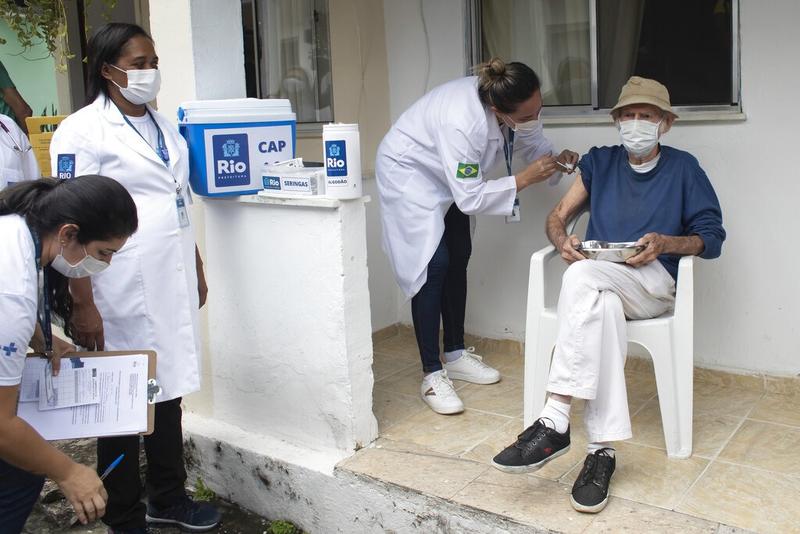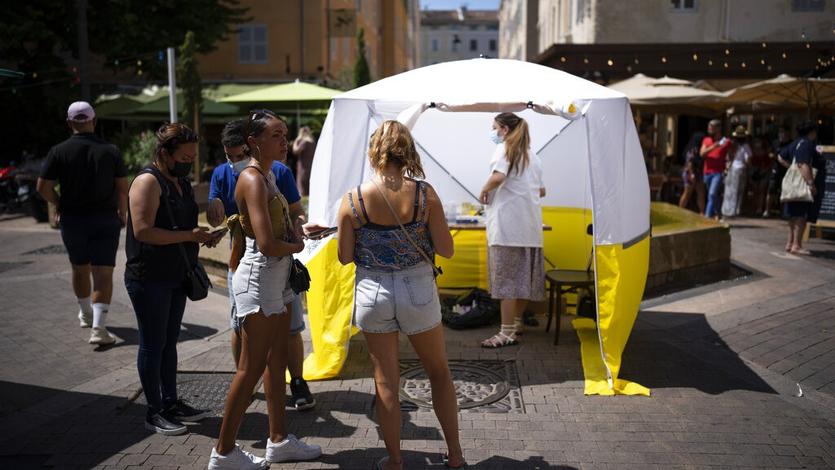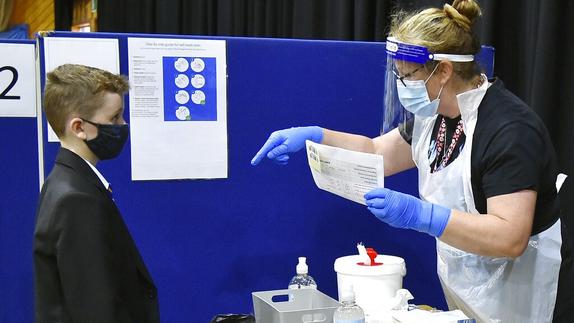 People wait to be inoculated against COVID-19 at the Babelsberg vaccination center in Potsdam near Berlin, northeastern Germany, on May 27, 2021.
(SOEREN STACHE / AFP)
People wait to be inoculated against COVID-19 at the Babelsberg vaccination center in Potsdam near Berlin, northeastern Germany, on May 27, 2021.
(SOEREN STACHE / AFP)
ROME / MOSCOW / LONDON / BUCHAREST / TBILISI / ADDIS ABABA - Germany's Health Minister Jens Spahn has expressed concern about the large number of elderly Germans still unvaccinated against COVID-19.
“Of the 24 million people over the age of 60, just under 4 million are still unvaccinated,” Spahn told Funke Mediengruppe newspapers.
“If the very contagious delta variant were to infect a large proportion of this group within a few weeks, our intensive care units would come under great stress.”
The pace of new infections in Germany continues to slow, according to the latest figures published by the Robert Koch Institut, with the seven-day incidence rate - a key measure watched by the government - dropping to the lowest since Aug 27.
Africa
The number of confirmed COVID-19 cases in Africa reached 8,146,310 as of Sunday afternoon, the Africa Centers for Disease Control and Prevention (Africa CDC) said.
The death toll from the pandemic stood at 206,179 while some 7,480,123 patients across the continent have recovered from the disease so far, the Africa CDC said.
ALSO READ: COVAX cuts 2021 vaccine supply forecast by 500m doses
Belgium
Belgium will gradually phase out support for businesses affected by the pandemic by year-end, Finance Minister Vincent Van Peteghem said on Flemish TV show ‘De Zevende Dag’.
The government hasn’t reached an agreement yet to extend any support measures beyond Sept 30.
A measure that will definitely lapse at the end of this month is the reduced VAT rate of 6 percent for bars and restaurants, Van Petegem said. Drinks will be subject to a 21 percent VAT rate again as of Oct 1 and prepared food will be taxed at the usual 12 percent.
 An elderly man is injected with a dose of the Pfizer COVID-19 vaccine during a third dose campaign for elderly residents in long-term care institutions, at a retreat for elderly artists in Rio de Janeiro, Brazil, Sept 1, 2021. (BRUNA PRADO / AP)
An elderly man is injected with a dose of the Pfizer COVID-19 vaccine during a third dose campaign for elderly residents in long-term care institutions, at a retreat for elderly artists in Rio de Janeiro, Brazil, Sept 1, 2021. (BRUNA PRADO / AP)
Brazil
Brazil reported 150,106 new COVID-19 cases on Saturday, which included 92,614 previously unreported infections.
The Health Ministry provided no details except to say the backlogged cases were from Rio de Janeiro state, going back to 2020.
The number, the highest one-day tally on record, pushed total infections to 21,230,325, the ministry reported. Deaths rose by 935 in the last 24 hours, totaling 590,508.
With the previously unreported cases, the daily count of roughly 60,000 is far higher than the seven-day average of about 15,000.
The ministry did not explain why the number of infections still appeared to spike.
 People wait for their COVID-19 test results at a rapid testing tent set up to provide tests for the new health pass at a restaurant plaza in Marseille, southern France, Aug 9, 2021. (DANIEL COLE / AP)
People wait for their COVID-19 test results at a rapid testing tent set up to provide tests for the new health pass at a restaurant plaza in Marseille, southern France, Aug 9, 2021. (DANIEL COLE / AP)
Europe
The main coronavirus indicators are improving across Europe, even though individual countries use different strategies to confront the spread of the pandemic.
According to the European Center for Disease Prevention and Control (ECDC), there were nearly 380,000 laboratory-confirmed coronavirus cases in the 30-nation European Economic Area (EEA), which includes 27 countries that make up the European Union, plus Norway, Iceland, and Lichtenstein, in its latest weekly report, which closed Sept 17.
That is the sixth consecutive week that the weekly figure dropped.
The EEA's weekly total cases are far below the 2021 peak of more than 1.1 million new cases recorded from March 28 to April 3, and the all-time peak of more than 1.4 million new cases in November 2020.
That improvement has come despite wide variations in the vaccination rate among EEA states. Less than half of adult populations in Bulgaria, Croatia, Latvia, and Romania are fully vaccinated, while in Denmark, Iceland, Ireland, Malta, and Portugal the equivalent rate is above 85 percent each, according to data from the ECDC.
Health rules against the pandemic also differ significantly from each other.
This week, Italy, for example, became the first European country to require the "green pass" for health for all workers in both public and private sectors, which will become effective in mid-October. The "green pass" shows proof of vaccination, recovery from the virus, or a recent negative coronavirus test.
France, meanwhile, which has recorded nearly 7 million coronavirus cases since the start of the pandemic, more than any other country in the EEA, said it will maintain its current coronavirus health restrictions despite a reduction in cases since recent peaks a month ago.
The Netherlands recently announced it would drop mandatory 1.5-meter social distancing rules, which will be effective from Sept. 25.
And in Malta, the government announced on Wednesday that most citizens returning to the country from high-risk areas can quarantine at home rather than in specially designated hotels.
Georgia
Georgia reported on Saturday 1,997 new COVID-19 cases, taking its total to 593,763, the country's center for disease control reported.
Data from the National Center for Disease Control and Public Health showed that 1,232 more patients have recovered from the disease in the past 24 hours, taking the total number of recoveries to 558,042.
Meanwhile, 52 people died in the last 24 hours, raising the nationwide death toll to 8,498.
Global tally
Coronavirus cases worldwide surpassed 228.16 million while the global death toll topped 4.68 million, according to data compiled by Johns Hopkins University.
 In this file photo dated Sept 13, 2021, a teacher (left) has her COVID-19 green pass checked by a school worker as she arrives at the "Isacco Newton" high school, in Rome. (ANDREW MEDICHINI / FILE / AP)
In this file photo dated Sept 13, 2021, a teacher (left) has her COVID-19 green pass checked by a school worker as she arrives at the "Isacco Newton" high school, in Rome. (ANDREW MEDICHINI / FILE / AP)
Italy
Italy’s decision to make COVID-19 “passports” mandatory for all public and private sector workers from Oct 15 is boosting the country’s vaccination campaign, said COVID Emergency Czar Francesco Paolo Figliuolo.
“This week we have seen a 20-40 percent increase in bookings for first vaccine doses, compared to last week,” Figliuolo wrote late Saturday.
Last week, Italy’s government approved a measure requiring workers to demonstrate vaccination, a past COVID-19 infection or a recent negative test before entering workplaces. Workers will face fines of as much as 1,500 euros (US$1,763) if they don’t comply, while employers who fail to check their workers may have to pay as much as 1,000 euros.
Italy reported 51 coronavirus-related deaths on Saturday against 66 the day before, the health ministry said, while the daily tally of new infections rose marginally to 4,578 from 4,552.
Italy has registered 130,284 deaths linked to COVID-19 since its outbreak emerged in February last year, the second-highest toll in Europe after Britain and the ninth-highest in the world. The country has reported 4.63 million cases to date.
Patients in hospital with COVID-19 - not including those in intensive care - stood at 3,958 on Saturday, down from 3,989 a day earlier.
There were 31 new admissions to intensive care units, down from 34 on Friday. The total number of intensive care patients fell to 519 from a previous 525.
Romania
Daily COVID-19 cases surpassed 5,000 in Romania on Saturday, reaching 5,388, bringing the country's total infections to 1,144,893, announced the authorities.
The pandemic has so far claimed the lives of 35,456 Romanians and a total of 1,078,434 coronavirus patients have recovered, according to the Strategic Communication Group (GCS), the official novel coronavirus communication task force.
At a press conference, Adriana Pistol, director of the National Surveillance and Control Center of Transmissible Diseases, said on Saturday that insufficient vaccine coverage and non-compliance with protection measures were main causes for the surge of new cases.
Pistol warned that the daily new infections will exceed 15,000 at the end of October, if people are not willing to vaccinate or ignore protection measures.
Russia
Russia reported 20,174 new COVID-19 cases on Sunday, pulling the seven-day average higher to 19,265 cases, according to data compiled by Bloomberg.
Meanwhile, another 793 people have died from the illness.
Moscow Mayor Sergei Sobyanin, speaking in an interview to Rossiya-1 state television, said rising infections in the capital are due to people returning from holidays and children going back to school.
ALSO READ: WHO calls for global governance against COVID-19 pandemic
 A boy at COVID-19 test station as he entered his new secondary school for the first time at Wales High school, Sheffield, England, Sept 3, 2021. (RUI VIEIRA / AP)
A boy at COVID-19 test station as he entered his new secondary school for the first time at Wales High school, Sheffield, England, Sept 3, 2021. (RUI VIEIRA / AP)
UK
Jonathan Van-Tam, UK’s deputy chief medical officer, asked ministers to hold onto all clinical trial data from the EU if countries continue to deny entry for UK vaccine trial volunteers, The Guardian reported, without citing where it obtained the information.
UK officials have spoken to EU leaders about recognizing trial vaccines and a secondary option would be for volunteers to get a vaccine approved by the NHS, the Guardian said.
“We are clear that volunteers in formally approved COVID-19 vaccine trials in the UK should not be disadvantaged in relation to vaccine certification policies, and we are committed to taking action on this issue, including reviewing guidance on additional vaccination for this group,” a UK government spokesperson told The Guardian.
Another 30,144 people in Britain have tested positive for COVID-19, bringing the total number of coronavirus cases in the country to 7,400,739, according to official figures released Saturday.
The country also recorded another 164 coronavirus-related deaths. The total number of coronavirus-related deaths in Britain now stands at 135,147. These figures only include the deaths of people who died within 28 days of their first positive test.
United States
The Biden administration is negotiating with Pfizer Inc to buy an additional 500 million COVID-19 vaccines to donate globally, a person familiar with the matter said, doubling the government’s commitment to helping less-wealthy countries.
A deal is expected to be announced in the coming days, ahead of an international COVID-19 summit Biden has called for on the sidelines of the United Nations General Assembly, according to the person, who spoke on condition of anonymity because the information isn’t yet public.
The Biden administration struck a nearly identical agreement with the company in August, and Pfizer has been shipping those doses to the international vaccine program COVAX.
Meanwhile, California Governor Gavin Newsom, who survived a recall election partly on his handling of the pandemic, tweeted on Saturday that California now has the lowest infection rate among US states.
The most populous US state had rate of 113 cases per 100,000 people, over the last seven days, according to the latest data from the Centers for Disease Control and Prevention.
The next closest state was Connecticut, almost 126 cases per 100,000. Florida had 353 per 100,000, CDC data show.
He also said that California had crossed the milestone of administering at least one dose to 70 percent of the population.


